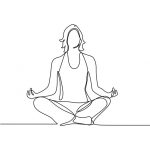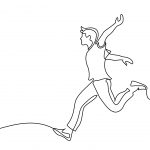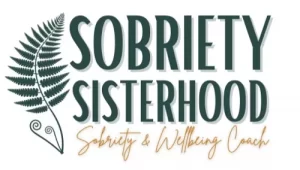Supporting Sobriety
I’ve been listening to the excellent podcasts by Ellen Woods and Simon Chapple (Sobriety Unleashed) and have been struck by the number of times the attitudes of mindfulness come up in the discussions around successful sobriety. I have been alcohol-free / sober for twenty four years and have used mindfulness techniques to maintain my lifestyle.
 I am a mindfulness teacher, but actually prefer to think about mindfulness as awareness, rather than focusing on the meditative element which is now firmly associated with mindfulness. I’m not saying that meditation is not important, nor am I claiming that meditation should not be part of your mindfulness practice, but I do think that the support mindfulness gives to all aspects of our lives begins with awareness.
I am a mindfulness teacher, but actually prefer to think about mindfulness as awareness, rather than focusing on the meditative element which is now firmly associated with mindfulness. I’m not saying that meditation is not important, nor am I claiming that meditation should not be part of your mindfulness practice, but I do think that the support mindfulness gives to all aspects of our lives begins with awareness.
Awareness is at the start of all our life changes, without awareness there can be no recognition of the need to change. In the podcasts, Ellen and Simon have been exploring some key areas relating to sobriety, such as when should you begin to question your patterns of drinking? The answer is when you become aware of your drinking as something that is out of control or having a greater control over you than you would like. This requires us to become self-aware.
Awareness of yourself begins with the attitudes of mindfulness – non-judgement, patience, beginner’s mind, trust, non-striving, acceptance, letting go, gratitude and generosity.
Following on from my previous blog post where I outlined the benefits of non-judgement, in this blog I’m going to consider the attitude of beginner’s mind, the curiosity about yourself that has been mentioned in Ellen’s podcasts.
 Curiosity has formed an important part of the journey to sobriety for most of us, me included. It is curiosity which brings us to question our relationship to alcohol. Whether it is for health reasons, lifestyle reasons or even a charity challenge, the beginner’s mind is our route to exploring what relationship we have to alcohol. Only by being open to exploring our own feelings about alcohol and doing that with total honesty, will we be able to provide ourselves with a starting point for our sobriety journey. If your thoughts about giving up alcohol even for a short time, perhaps a 30-day challenge (Go Sober for October / Dry January or whichever month), are that you are worried if you will be able to make through to the end of the challenge, it is definitely time to turn your beginner’s mind on yourself.
Curiosity has formed an important part of the journey to sobriety for most of us, me included. It is curiosity which brings us to question our relationship to alcohol. Whether it is for health reasons, lifestyle reasons or even a charity challenge, the beginner’s mind is our route to exploring what relationship we have to alcohol. Only by being open to exploring our own feelings about alcohol and doing that with total honesty, will we be able to provide ourselves with a starting point for our sobriety journey. If your thoughts about giving up alcohol even for a short time, perhaps a 30-day challenge (Go Sober for October / Dry January or whichever month), are that you are worried if you will be able to make through to the end of the challenge, it is definitely time to turn your beginner’s mind on yourself.
What will it be like to be without alcohol? The only way to find out will be to try … but if you do not keep track with mindful awareness, you may not notice the differences. Your beginner’s mind is there to keep you focused on your awareness of yourself. Open yourself to the awareness of yourself. Much of the mindful meditation practice is based on this, but awareness of self doesn’t have to be done in meditation. Give yourself a moment, right now, and see what you can identify about yourself. It doesn’t have to be deep and meaningful, right now I can feel a certain stiffness in my left leg, my fingers are cold, I can hear my puppy snoring next to me, I am trying to concentrate on this blog, but there is a part of my mind planning my dinner tonight. If I try and explore my emotions, I am quite calm, content even. This is my inventory of myself right now, applying my beginner’s mind. It is part of the training of mindfulness to make use of the beginner’s mind to enable us to check in with ourselves at any time.
Now imagine yourself in the midst of a craving. How powerful would it be to be aware of the physical and mental feelings associated to a craving? To be able to sit for a moment, explore the feelings and sensations? To take a moment to work out if what you are actually craving is sugar, or the need to take control of your stress, or whether it is just that time of day when you habitually have a drink, or its ‘monkey see, monkey want’ and you are reacting to a visual stimulation. Turning your curiosity onto yourself, becoming more aware of your physical and mental wellbeing will help you to maintain your focus on your goal.

But that is not the only application of the beginner’s mind. Turn that curiosity on the world around you and allow yourself to experience the moment you are in. What can you see, hear, smell or touch? This is an excellent way of grounding yourself in moments of stress, turning your focus away from the stressor and onto the simple things around you. Have you ever been for a walk with a very young child? I can strongly recommend it as an exercise for engaging your beginner’s mind. I am fortunate to have many grandchildren, ranging in age from toddler to late teens. It still gives me tremendous delight to take a walk with the toddler, stopping every other step to examine a leaf, a bug, a crack in the pavement, all new experiences and things to be examined and discussed. How often do we rush through our days and never give ourselves time to simply be in the moment? Meditation is the ultimate use of the beginner’s mind, the focus on just being, without trying to do anything other than that. But we can practice using the beginner’s mind by giving ourselves space in our day to reflect simply on the moment we are in.
Add the experience of using the beginner’s mind to the attitude of non-judgement and we have a powerful combination of awareness and acceptance of what we find. Imagine not judging yourself for having that craving, but simply observing it, understanding it and letting it pass without action.
Mindful awareness has helped me in my sober journey and continues to help me with the recognition of my triggers and moments when I could return to my old habits and lifestyle. It takes practice – remember, practice makes permanent.
